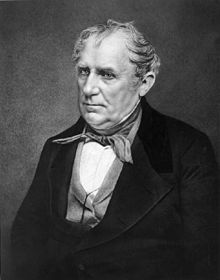James Fennimore Cooper
| James Fenimore Cooper | |
|---|---|

Photograph by Mathew Brady, 1850
|
|
| Born |
September 15, 1789 Burlington, New Jersey |
| Died | September 14, 1851 (aged 61) Cooperstown, New York |
| Occupation | Novelist, Historian, and US Navy sailor |
| Genre | Historical fiction |
| Literary movement | Romanticism |
| Notable works | The Last of the Mohicans |
James Fenimore Cooper (September 15, 1789 – September 14, 1851) was a prolific and popular American writer of the early 19th century.
His historical romances of frontier and Indian life in the early American days created a unique form of American literature. He lived most of his life in Cooperstown, New York, which was founded by his father William on property that he owned. Cooper was a lifelong member of the Episcopal Church and, in his later years, contributed generously to it. He attended Yale University for three years, where he was a member of the Linonian Society, but was expelled for misbehavior.
Before embarking on his career as a writer, he served in the U.S. Navy as a midshipman, which greatly influenced many of his novels and other writings. The novel that launched his career was The Spy, a tale about counterespionage set during the Revolutionary War and published in 1821. He also wrote numerous sea stories, and his best-known works are five historical novels of the frontier period known as the . Among naval historians, Cooper's works on the early U.S. Navy have been well received, but they were sometimes criticized by his contemporaries. Among his most famous works is the Romantic novel The Last of the Mohicans, often regarded as his masterpiece.
James Fenimore Cooper was born in Burlington, New Jersey in 1789 to William Cooper and Elizabeth (Fenimore) Cooper, the eleventh of 12 children, most of whom died during infancy or childhood. He was descended from James Cooper of Stratford-upon-Avon, Warwickshire, England, who immigrated to the American colonies in 1679. James and his wife were Quakers who purchased plots of land in New Jersey and Pennsylvania. Seventy-five years after his arrival in America, his great-grandson William was born on December 2, 1754. Shortly after James' first birthday, his family moved to Cooperstown, New York, a community founded by his father on a large piece of land which he had bought for development. Later, his father was elected as a United States Congressman from Otsego County. Their town was in a central area of New York that had previously been occupied by the Iroquois of the Six Nations. The Iroquois were forced to cede their territory after British defeat in the Revolutionary War, as they had been allies.
...
Wikipedia
